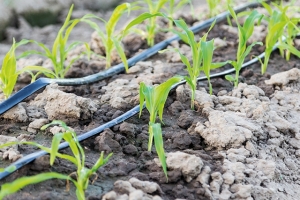Saving Water Promotes Agriculture & Helps Counter Climate Change
Drip irrigation systems have been installed in three villages of eastern Georgia, Eniseli, Ruisi and Bediani, with support from the United Nations Development Program (UNDP), Global Environmental Facility (GEF) and the Ministry of Environmental Protection and Agriculture of Georgia. This demonstration initiative shows the benefits of water-saving technologies in promoting sustainable farming and countering climate change. It is part of the regional UNDP-GEF Kura II Project that assists Azerbaijan and Georgia in harmonizing water use policies and practices.
Representatives of the UNDP, the Ministry of Environmental Protection and Agriculture of Georgia and the implementing company Amelioration Ltd. visited the village of Eniseli in Kvareli Municipality on Wednesday to meet local farmers and authorities and see the new drip irrigation system in operation.
“Sustainable agriculture technologies save water and help increase crop yields,” said Deputy Minister Nino Tandilashvili. “With up-to-date methods of farming, we can better protect our national water resources and increase the income of local farmers.”
“Climate change is bringing dryer and warmer weather to eastern Georgia and all of Azerbaijan,” said UNDP Head Louisa Vinton. “By helping to manage water sustainably in this predominantly agricultural transboundary river basin, we are working to further foster international cooperation at a time when we are facing increasingly scarce water resources.”
“In the Kura Basin, agriculture accounts for 70% of total water use. Reducing excess ground and surface water withdrawals will further contribute to food and water security in the region,” said UNDP-GEF Kura II Regional Project Coordinator Mary Matthews. “Understanding the benefits of water saving technologies allows farmers to improve their livelihoods despite the spectre of climate change.”
To demonstrate the efficiency of drip irrigation, studies of crop patterns, crop production and water use will be carried out in the pilot villages before and after the installation of the systems. Local farmers and representatives of the farmers’ associations will attend educational seminars to learn how to use and manage the irrigation and drainage systems. The three locations were chosen to show that drip irrigation is effective for a variety of different crops: grapes in Eniseli; potatoes in Bediani; and onions in Ruisi.
The Kura II Project has a total budget of $5.3 million, which is shared between the two countries. The project is in its third year of implementation and is due to conclude in 2020.
Image source: interplast.com












